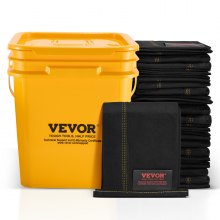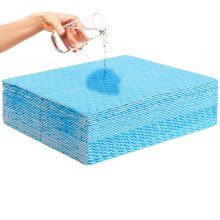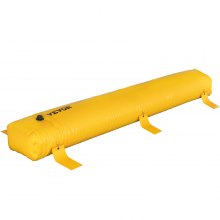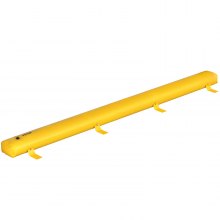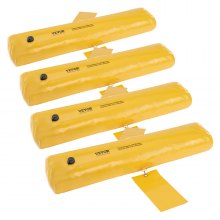Explore VEVOR Water Barriers to Ensure Safety & Security Against Flooding
Whether in our houses or the media, we have all witnessed floodwaters sweeping entire towns and cities. Flooding can be prevented or controlled in many ways, but it is unavoidable that some water will escape.
Sandbags can stop water from entering, but they are far from infallible. This prompted forward-thinking businesses to develop flood barriers. VEVOR water barriers are among the most innovative, effective, and practical ways to reduce and prevent flooding.
How Do Water Barriers Work?
Removable flood barriers are used to divert or contain floodwaters. Their main objective is to safeguard a residence or place of business from flooding by preventing disaster or blockage when floods occur.
They may be set up and taken down multiple times because they are demountable. As a result, they are simple to store during dry seasons and to deploy as soon as flood warnings are issued. Water flood barriers have two vertical channels that slip into position and are installed at the perimeter of open entryways.
When the panels are secured, a sealed wall is formed to stop any leaks. Each panel is constructed with identical proportions. You may pile them as tall as the channels were constructed based on your demands. It can be removed and put back in storage easily after the flood waters subside.
Properties and companies may be swiftly cleaned and restored with minimal damage and water infiltration. Doing this will significantly decrease the quantity of time lost, and normalcy will be restored.
There are many different sizes and lengths of flood barriers. They are constructed following the required entryway's width. Aluminum or a composite material is used to make the panels. Composite-based panels are only available in dimensions of up to 1.5 meters, although both are sturdy and dependable.
Applications of Water Barriers
Water barriers have been used for a long time to prevent flooding, but they also have many other uses. Let us examine a few unusual uses for water barriers that highlight their adaptability and capacity to handle different problems.
Stormwater Management
Controlling stormwater runoff is essential to avoid flooding and pollution in metropolitan areas. Permeable surfaces and wetlands are water barriers that help manage rainfall flow so that it does not overflow sewage systems but is absorbed organically into the earth. These flood control barriers improve water quality while lowering the chance of urban flooding.
Water-Based Art Installations
Water barriers have become popular among artists as a medium for their works. Temporary works that interact with water to elicit feelings in viewers and draw them in include floating barriers, shiny surfaces, and light. Such artistic activities not only enhance public places but also catalyze dialogue around environmental concerns and preserving water.
Controlling Soil Erosion
Water barriers are essential for doing so. They can lessen the erosive effect of water, limiting land loss and maintaining ecosystems, by strategically erecting barriers along susceptible riverbanks or beaches. Flood protection barriers are frequently built using eco-friendly materials like jute mesh and coir logs to encourage plant growth and improve soil stability.
Benefits of Water Barriers
Flood barriers and their various versions typically come out on top when looking for flood control measures that are equally appropriate for residential and commercial regions. Below are some benefits of water barriers.
Reduced Physical Impact
A further benefit of using water barriers is that they may be a better choice in case of an incident or mishap. Due to its structure and intended use, if the barriers are struck, they frequently do not move because of their close interlocking systems and the sheer weight of the filled-with water bases.
Another thing to remember is that the flood control barrier considerably lessens the physical force of a collision. Barriers filled with water give some flexibility that might render them a safer option while still providing powerful and reliable protection.
Reduce Theft Rate
Theft is frequently problematic when markers and other mobile objects are employed. High-quality water-filled barriers with anti-tamper plugs reduce the possibility of theft by making it nearly hard to pass through them without authorization.
Once full, their weight acts as a further obstacle to theft. However, it is incredibly light when empty. Until they are filled with liquid or sand, they can grow to be extraordinarily powerful and nearly impossible to move.
No Gaps in the Barrier
Waterfilled flood barriers help keep roads open, prevent disturbance, and create the least interruption for all parties concerned, allowing work to be done safely. Contrary to traffic cones, water-filled flood barriers feature a connecting design that offers and serves as an additional measure of security and safety.
As a result, there is no real gap in the protective barrier, which can increase employee and public safety.
Why Purchase VEVOR Water Barriers
For many reasons, investing in VEVOR water barriers is a wise decision. These cutting-edge barriers provide unrivaled flood protection, preventing water from harming your property during severe rainfall or storms. The high-quality materials used to create VEVOR's water barriers guarantee their lifespan and durability, ultimately saving you money.
Additionally, they are exceedingly simple to set up when required and installed, making them a practical option for domestic and industrial applications. Their adaptability allows for usage in building sites, road construction, and environmental conservation initiatives.
FAQs About Water Barriers
Q: What materials are commonly used in water barriers?
Concrete, earth berms, and steel are frequently used as water barriers, among other materials. For flood protection, concrete barriers' strength and durability are essential. Steel sheet piles are adaptable and frequently utilized in short-term applications. Earth berms, constructed from compacted dirt, offer a sustainable and affordable option for flood mitigation.
Q: Do water barriers require maintenance?
Like dams and retaining walls, water barriers require routine upkeep to maintain strength and prevent possible cracks that could cause floods and environmental harm.
Q: Can water barriers fail?
Water barriers may fail due to erosive conditions, structural flaws, or poor upkeep. Correct construction and periodic checks are essential to guard against possible cracks and minimize flooding.

























































































































